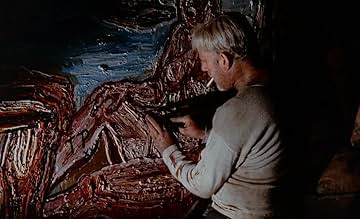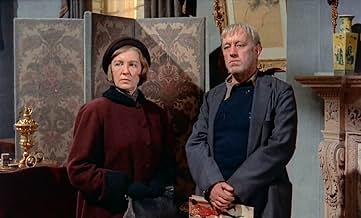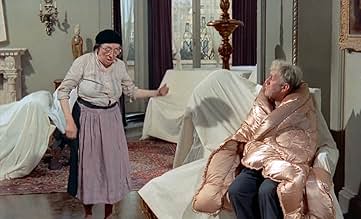IMDb RATING
6.9/10
4.1K
YOUR RATING
An ill-behaved, lovably scruffy painter, Gulley Jimson, searches for a perfect canvas, determined to let nothing come between himself and the realization of his exalted vision.An ill-behaved, lovably scruffy painter, Gulley Jimson, searches for a perfect canvas, determined to let nothing come between himself and the realization of his exalted vision.An ill-behaved, lovably scruffy painter, Gulley Jimson, searches for a perfect canvas, determined to let nothing come between himself and the realization of his exalted vision.
- Nominated for 1 Oscar
- 5 wins & 6 nominations total
Renee Houston
- Sara Monday
- (as Renée Houston)
John Adams
- Police Officer
- (uncredited)
Chris Adcock
- Workman
- (uncredited)
Andy Alston
- Workman
- (uncredited)
Timothy Bateson
- Clerk to Borough Surveyor
- (uncredited)
Victor Brooks
- Foreman
- (uncredited)
Peter Bull
- Man in Taxi
- (uncredited)
- Director
- Writers
- All cast & crew
- Production, box office & more at IMDbPro
Featured reviews
Ingenious, fun, silly, playful, entertaining, strange. All of these things represent not only the movie, but of Alec Guinness' portrayal of Gully Jimson, a grainy, foul mouthed old artist, trying to make it in life through his paintings. We're introduced to him from jail, and it unfolds in the sense where learning about him is also either liking or hating what life has brought him to be. Just make sure that you're not going to be an artist, or his protégé (who takes an awful lot of bullying). This is another forgotten film in time in that it's perfect casting, and perfect direction. It's an effortless viewing movie that will bring much satisfaction to viewers of any age, who aren't familiar with Alec Guinness' work besides the obvious. His passionate, sometimes surly characterization of a brilliant painter is one that should last for the ages.
"Horse's Mouth" certainly stands up well in it's advanced age; at 45 years old it has remained as timeless as any of the great comedic films.
One IMDb writer has tagged Gully as a "vulgar" painter, which goes to show that the sensitivities this film violated are still around. Pinching your loving ex's bum and tickling the rich lady's knee (shades of Groucho), though, are pretty tame today.
Gully Jimson is a rich character, Chaplin-like, who single-mindedly pursues painting while disillusioning aspiring young Nosey about the artist's life. All growled on tiptoes by one of film's classic great actors.
Jimson is a man who's given up all else, including health, wealth, conventional relationships, to live in a leaky houseboat with a vision. But as the story develops it, like all great literature, manages to puncture almost all of life's rationalizing balloons. Jimson is valorized as is Don Quixote, without suggesting that his hero's journey is a painless one.
All is set in a colorful environment with a delightful if conventionally unpolished cast, all the improbably gleeful turns that make the Marx movies so delightful, and a director who contrives seamlessly with Guiness to create a clever and hilarious marvel that can be enjoyed over and over.
Heck yeah, there's even a chase scene! And pull your socks up!
The DVD version includes a short by Pennebaker that feels as fresh and contemporary, accompanied by a Duke Ellington tune, which played along with "Horse's" original release.
One IMDb writer has tagged Gully as a "vulgar" painter, which goes to show that the sensitivities this film violated are still around. Pinching your loving ex's bum and tickling the rich lady's knee (shades of Groucho), though, are pretty tame today.
Gully Jimson is a rich character, Chaplin-like, who single-mindedly pursues painting while disillusioning aspiring young Nosey about the artist's life. All growled on tiptoes by one of film's classic great actors.
Jimson is a man who's given up all else, including health, wealth, conventional relationships, to live in a leaky houseboat with a vision. But as the story develops it, like all great literature, manages to puncture almost all of life's rationalizing balloons. Jimson is valorized as is Don Quixote, without suggesting that his hero's journey is a painless one.
All is set in a colorful environment with a delightful if conventionally unpolished cast, all the improbably gleeful turns that make the Marx movies so delightful, and a director who contrives seamlessly with Guiness to create a clever and hilarious marvel that can be enjoyed over and over.
Heck yeah, there's even a chase scene! And pull your socks up!
The DVD version includes a short by Pennebaker that feels as fresh and contemporary, accompanied by a Duke Ellington tune, which played along with "Horse's" original release.
Alec Guinness wrote the screenplay. Already an actor of great repute, in doing so he was in a very dominating position. The film gives the impression of a much less collaborative affair - writer/director/star - than is usual, or successful. Very hard for director to question a portrayal when the star can truthfully say that he knows the character far better than does the director.
Guinness chose a deep croaky voice. He consequently lost all musicality - most obviously when he sings but throughout his voice is an inexpressive monotone. The dialogue lacks sparkle further dulled by his monotone. There is a problem in any case of portraying a talented but inarticulate artist - how do you indicate talent or even genius? Apparently based on the writer Dylan Thomas, whose drunkenness was companionable (Richard Burton once a companion?), there was no doubt wit in their conversation. Here the painter is mainly rascally, the paintings shown don't particularly impress either intrinsically or by the way they are treated. All that is left is the implication that for someone so badly behaved yet to still be sought after, must have a great deal of talent. The film fails to show people being won over by his pictures and forgive his trespasses - that's a failure of direction.
Given the great talents involved, it is less than it could have been. But given these talents, it should not in anyway be patronised. Even great artists get it wrong sometimes, it doesn't affect their greatness or my admiration.
Guinness chose a deep croaky voice. He consequently lost all musicality - most obviously when he sings but throughout his voice is an inexpressive monotone. The dialogue lacks sparkle further dulled by his monotone. There is a problem in any case of portraying a talented but inarticulate artist - how do you indicate talent or even genius? Apparently based on the writer Dylan Thomas, whose drunkenness was companionable (Richard Burton once a companion?), there was no doubt wit in their conversation. Here the painter is mainly rascally, the paintings shown don't particularly impress either intrinsically or by the way they are treated. All that is left is the implication that for someone so badly behaved yet to still be sought after, must have a great deal of talent. The film fails to show people being won over by his pictures and forgive his trespasses - that's a failure of direction.
Given the great talents involved, it is less than it could have been. But given these talents, it should not in anyway be patronised. Even great artists get it wrong sometimes, it doesn't affect their greatness or my admiration.
My late wife, an artist, loved this film, and it gave me such insights into the way her mind worked. Guiness is wonderful; for once we see many levels of the character he portrays. Kay Walsh is so touching as the woman in his life, while Mike Morgan makes the perfect art groupie. It's funny to see Dr. Pastorious in old age; he has barely changed since Bride of Frankenstein.
The humor is gentle and quiet except for the studio renovation scene, but it is when Gully stands in front of a canvas that the truth of this film comes out. His almost soliloquy on the human foot; the scene where he shrugs and says that was not what he was trying to say, after he has ruined the toff's wall, these are priceless and our entry into an artist's mind. When the houseboat sets sail down the Thames, to the comment about the sea by the looney who pipes Gully aboard is a bit of perfection set on celluloid. He stands there, framing a vision of another canvas on the hull of a freighter, while reciting this wonderful doggerel that I always get mixed up when I try to say it, and all the while Nosey and Sara spur him on. I've never read the book and wonder if this represents his death, but I take from it what I will.
One other thought: there are certain films shot on location that should be filed away as time/place documentaries. This one is a perfect example: London 1958.
The humor is gentle and quiet except for the studio renovation scene, but it is when Gully stands in front of a canvas that the truth of this film comes out. His almost soliloquy on the human foot; the scene where he shrugs and says that was not what he was trying to say, after he has ruined the toff's wall, these are priceless and our entry into an artist's mind. When the houseboat sets sail down the Thames, to the comment about the sea by the looney who pipes Gully aboard is a bit of perfection set on celluloid. He stands there, framing a vision of another canvas on the hull of a freighter, while reciting this wonderful doggerel that I always get mixed up when I try to say it, and all the while Nosey and Sara spur him on. I've never read the book and wonder if this represents his death, but I take from it what I will.
One other thought: there are certain films shot on location that should be filed away as time/place documentaries. This one is a perfect example: London 1958.
Although most Americans have little knowledge of his work other than Star Wars, Alec Guinness produced an amazing body of work--particularly in the 1940s-1950s--ranging from dramas to quirky comedies. I particularly love his comedies, as they are so well-done and seem so natural and real on the screen--far different from the usual fare from Hollywood.
I first saw this movie when I was about 13 or so, and didn't appreciate it very much. Years later, when I became fascinated with Guinness' comedies, I decided to give it another chance. And boy am I glad I did!! The movie concerns the life of an extremely edgy and rather nasty artist. Guinness really plays this up and creates one of the quirkiest and funniest characters I have ever seen. In essence, the man is a rascal that is driven to create his art regardless of what it takes to get it done! What I missed the first time I saw the film were the extremely catchy music and the amazing art created for this movie. I am not the biggest fan of modern art, but the second time i saw the movie I really liked most of the works done for the movie--it just was a darn shame that much of it was destroyed in the course of the movie! In addition to music and art, the performances throughout of all the actors was nearly perfect.
Finally, the version of the movie I saw last was from the Criterion Collection. Get this version!!!! It had so much wonderful background information about the actual art, the making of the movie, and interesting background information--such as how they got the musical score WITHOUT having to pay royalties and the incredibly sad tale of a magnificent performance by a young supporting actor that did not live to see the finished product.
I first saw this movie when I was about 13 or so, and didn't appreciate it very much. Years later, when I became fascinated with Guinness' comedies, I decided to give it another chance. And boy am I glad I did!! The movie concerns the life of an extremely edgy and rather nasty artist. Guinness really plays this up and creates one of the quirkiest and funniest characters I have ever seen. In essence, the man is a rascal that is driven to create his art regardless of what it takes to get it done! What I missed the first time I saw the film were the extremely catchy music and the amazing art created for this movie. I am not the biggest fan of modern art, but the second time i saw the movie I really liked most of the works done for the movie--it just was a darn shame that much of it was destroyed in the course of the movie! In addition to music and art, the performances throughout of all the actors was nearly perfect.
Finally, the version of the movie I saw last was from the Criterion Collection. Get this version!!!! It had so much wonderful background information about the actual art, the making of the movie, and interesting background information--such as how they got the musical score WITHOUT having to pay royalties and the incredibly sad tale of a magnificent performance by a young supporting actor that did not live to see the finished product.
Did you know
- TriviaWhen Nosey offers Bisson a bowl of stew, Michael Gough's voice on the soundtrack says "Buzz off!" but his lips form the words "Drop dead!" Presumably the line was changed when Mike Morgan died suddenly before the movie was released.
- GoofsWhen Nosey tries to feed Lolley while she's posing nude for Abel's sculpture, it's briefly revealed that the actress is in fact wearing a top.
- Quotes
Gulley Jimson: Go and do something sensible, like shooting yourself! But don't be an artist!
- SoundtracksLieutenant Kijé Op. 60
Written by Sergei Prokofiev (as Prokofieff)
Arranged by Kenneth V. Jones
Conducted by Muir Mathieson
- How long is The Horse's Mouth?Powered by Alexa
Details
- Release date
- Country of origin
- Official site
- Languages
- Also known as
- Na izvoru
- Filming locations
- Wormwood Scrubs Prison, Du Cane Road, East Acton, London, England, UK(exteriors Gulley Jimson leaving prison)
- Production company
- See more company credits at IMDbPro
- Runtime
- 1h 37m(97 min)
- Color
- Aspect ratio
- 1.66 : 1
Contribute to this page
Suggest an edit or add missing content


































